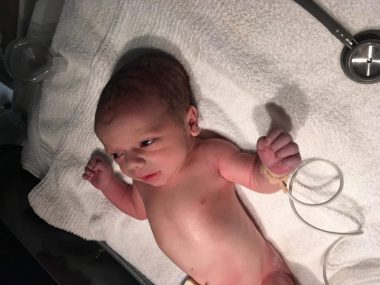Staying in the NICU After My Son’s Birth Helped With Postpartum Emotions

On Feb. 27, 2018 at 5 a.m., my son, Cayden, entered the world. I had a fairly normal pregnancy, so nothing could prepare me for the events that occurred once he was born. While some of it is a blur, I can still remember the chaos in the room at the time.
Right before I started pushing, Cayden’s heart rate dropped. Due to this, the doctor told me I had to get him out fast! After 30 minutes of pushing, they decided to use a vacuum to assist with the birth. Within minutes, he was finally out.
However, we were waiting for a cry that never came. Cayden was making a grunting noise, which they told me was a sign of distress. His hands and feet were also turning blue. After holding him for only a few seconds, the team of nurses rushed him off to the neonatal intensive care unit (NICU).

Cayden at birth, before being rushed to the NICU, in early 2018. (Photo by Keara Engle)
I had to wait a few hours to see him since my legs were still numb from the epidural. During the wait, the doctor came in to discuss what had happened. He informed me that Cayden had inhaled fluid at some point and was having trouble breathing on his own. While I was shocked, I was also ready to go see him!
Looking at his tiny little body lying in the bassinet warmed my heart. He was hooked up to a CPAP machine that helped him breathe, as well as to other wires that monitored his vital signs. All I could think about was how badly I wanted to hold my newborn child. After waiting all day, they finally allowed me to.
When I first heard that Cayden would have to stay in the NICU, I was crushed. While I knew he needed the help, I wasn’t looking forward to leaving him when I was discharged from the hospital. However, I found out that I wouldn’t have to.
The hospital I gave birth at offers pretty amazing things to NICU parents. As long as they have an extra room available, you’re allowed to stay at the hospital with your child until they are stable enough to go home. During Cayden’s three-week stay, I was able to stay the whole time except for two nights when a room wasn’t available.
This helped tremendously with my postpartum emotions. I felt much safer having my baby nearby as opposed to being 30 minutes away. I was able to stop by the NICU whenever I wanted. I would spend all day with him until I got too tired and headed back to my room.
Not only did I enjoy getting to stay close by, but I also felt relieved to have the nurses and lactation consultants available whenever I needed them. After those few weeks together, they almost felt like family. As a new mom, I had so many questions. It was much easier being able to ask any question and have an answer almost immediately.
I’ve heard others say that one of the hardest parts of the NICU is leaving your child and coming home empty-handed. What if this didn’t have to be the case anymore? Would postpartum depression rates in NICU mothers decrease?
I hope as hospitals continue to advance and evolve, they can all offer a place for parents to stay if their child has to be in the NICU. It truly does offer an extra level of comfort and could possibly help minimize the feelings of depression, anxiety, and postpartum depression that come along with having a child in the NICU.
***
Note: Pompe Disease News is strictly a news and information website about the disease. It does not provide medical advice, diagnosis, or treatment. This content is not intended to be a substitute for professional medical advice, diagnosis, or treatment. Always seek the advice of your physician or other qualified health provider with any questions you may have regarding a medical condition. Never disregard professional medical advice or delay in seeking it because of something you have read on this website. The opinions expressed in this column are not those of Pompe Disease News, or its parent company, BioNews, and are intended to spark discussion about issues pertaining to Pompe disease.







Comments